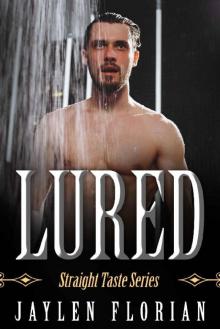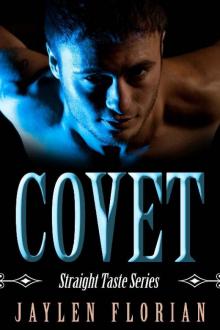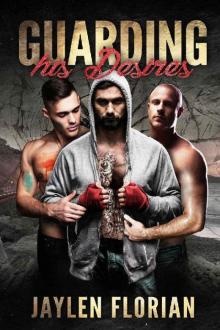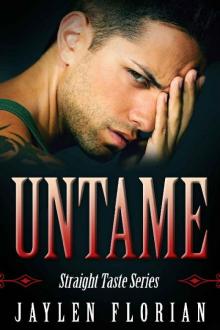- Home
- Jaylen Florian
Bravado (Unexpected Attraction Book 3) Page 3
Bravado (Unexpected Attraction Book 3) Read online
Page 3
Marshall said, "I'll need some time after this conference to quiz you about my concerns."
"I can't guarantee that's possible," Rodney replied. "We're dashing out of here as soon as we're done for a small reception with collectors and gallery owners."
"Can I attend that reception?"
"It's a private event at a private manor. There's no public aspect to it." Rodney caught sight of Patrick gesturing with his cane, signaling for him to get seated. Rodney added, "Just try to ask your questions during this event."
"I'm not sure you'd want that," Marshall said.
The reply stunned Rodney. "That sounds cryptic." When Marshall didn't reassure him otherwise or attempt to contradict this assertion, Rodney said, "I can try to call or email you soon, though I can't promise when I'll be able to do so. Excuse me, Mr. Clay. It's time to begin."
In contrast to the morning event with the mayor, which had so much pomp and fanfare, Rodney directly launched into his remarks the moment he was seated. He explained that he had the greatest respect for the city's history and bridges, and that his designs would blend into the ambience of downtown Doyle. He thanked, by name, teachers and professors who had influenced his schooling and education while growing up in the area.
Though some drawings and renderings of his sculptures were displayed on easels behind him, Rodney remembered not to try and explain his designs or illuminate the meanings behind his artistic choices. He ascribed to the belief that art should speak for itself, to the greatest extent possible, without the need for the artist to clarify or interpret it for the viewers.
Receiving a warm reception from most of the reporters, Rodney settled in for some rounds of questions. As their inquiries were exactly as he'd expected, he was ready with clever and appropriate answers, which he tried to convey with animated charm. He stayed in tone and moved into a comfortable rhythm with his thoughtful responses.
Since things were going so well, he confidently decided to call on Marshall Clay, who'd raised his hand to speak. Until now, Marshall had remained expressionless as the event winded toward its conclusion.
Marshall stood up, and said, "This morning Mayor Dimitri Ustinov referred to your studies at Poirot Academy of Fine Arts in London."
Rodney nodded.
"You graduated from the academy with a degree?"
Rodney resisted the urge to frown or shift in his seat, or display any other sign of discomfort. But, he thought, where is this guy going with this? What're his intentions?
"My artistic studies in London were on a limited basis, for a specific series of courses and seminars, which were not assigned in the formal degree programs."
"The name of that specific series of courses and seminars, please?"
"I'll have to get back to you with that information."
"I hope you do. And what year—or years—were you at the academy?"
"Same answer. You'll hear from me soon."
Rodney folded his hands together and smiled at the other reporters gathered in the workshop. He said, "That's all we have time for, unfortunately. Thank you very much for coming this afternoon. I look forward to seeing all of you again at the formal unveiling of the bridge installations."
At Patrick's side, Rodney swiftly departed while maintaining a genial disposition. Most of the journalists appeared satisfied, as Rodney took a final glance around the room, with the exception of Marshall Clay, who fixed him with an unblinking stare.
The guy is like a fortress wall, revealing almost nothing, Rodney thought.
But did he detect, to a slight degree, pity from the reporter? Of all things, just pity?
Exiting Emily Odell Hall, out of range of anyone else, Patrick and Rodney picked up their pace striding across the plaza.
Patrick hissed his dismay, and said, "Why did you call on that asshole?"
"I don't know. I wish I hadn't done it."
"That was an unforced error. Not good."
"I'm sorry, Patrick. I should've stuck to the friendly ones, as planned."
"Duh."
"How bad's the damage?"
"Perhaps there'll be none, at least from any of the others. But this is the worst possible time for you to be marred by anyone in the press. So don't respond to that Clay prick, even though you said you would get back to him with information. Understand?"
"Okay."
"Leave him to me, Rod. I'm going to think this through. We can't have any fabrications come out of your mouth. They all have to come from me. As to whether I shave off the rough edges of the truth or just leave him hanging, I'll analyze the risks for us and act accordingly. Right this moment, my instincts are shouting that we shouldn't give that reporter any ammunition."
"Give him the silent treatment?"
"That often works."
Chapter 5
Marshall Clay knew full well the reason he'd been called in for an emergency meeting at The Port Cole Pioneer news agency.
The reaction to his exposé on sculpture artist Rodney Riggs Redfern—headlined as "False Bravado: Celebrated Sculptor Crafts Illusions"—had been immediate and harsh. Online feedback indicated widespread furor over his depiction of Redfern as duplicitous and a symbol of the hyperbole infesting the art industry.
It was an opinion piece, and labeled as such in the Sunday edition of the newspaper. Opinion pieces almost always invited both positive and negative feedback. That part was nothing new. However, nothing Marshall had written before had generated so much acute controversy online. Even his colleagues were calling Marshall and telling him he'd gone too far this time.
So the emergency meeting was no surprise. But Marshall expected it would be with his boss, the assignment editor. Instead, the meeting had been called by the big boss—Arlena Blanca, the editor-in-chief of The Port Cole Pioneer.
By the time Marshall arrived at the news headquarters—a brick structure which had once been a car factory—he hoped he was astute enough to get through the high-pressure meeting without becoming defensive.
Also, there was a silver lining here for him. Marshall no longer wanted to write about the arts. He'd been requesting a transfer into the hard news investigative division for the past six months, to no avail. Whether liked or not, Marshall regarded his column on Rodney Riggs Redfern as absolute proof of his reporting chops for digging up facts and challenging public relations assertions.
Arlena had a reputation for courageous journalism and intuitive fairness. Maybe she'd wade into the controversy only to realize Marshall's talents earned him the transfer he'd been seeking.
The first moment in her office, however, wasn't encouraging.
Arlena was on the phone as he approached her open doorway. She was seated behind an immaculate desk, though the rest of her office tables were cluttered with piles of documents and newspaper clippings. Muted cable news channels aired on the two televisions affixed to the wall across from her desk. Remaining on her call as she spotted him, Arlena pointed at Marshall and directed him toward one of the austere steel chairs facing her desk. She didn't make further eye contact with Marshall until she finished her call and stood to close her office door. It appeared she wanted to slam it, requiring great effort to latch it shut without undue force.
Uh oh. There's no doubt about it now, Marshall said to himself. She's super pissed.
Arlena sat back down, leaned back, crossed her heels on top of the corner of her desk, brushed a piece of lint off her pinstripe pantsuit, and folded her arms across her chest. Her coral stone bracelet was only slightly darker in hue than her short red hair. She let a pause hang between them for several seconds before speaking.
"You let us down."
"I don't understand how," Marshall said, careful not to be argumentative. "I carefully investigated the facts presented and analyzed in my column."
"We, the media, play a critical watchdog role in society," Arlena said. "We hold governments, companies, churches, and charities into account for their choices—and it is proper for us to do so."
&nb
sp; "I agree, of course."
"But not every thing we publish in print or on the web is related to this role. News agencies have other functions, too. At times, we only inform, entertain, or advertise. We run comics and horoscopes and community events calendars, and serve our readers in myriad ways."
"Yes, we do."
"Don't speak, Marshall. Not yet. I need you to listen and then answer me when I've asked for your reaction."
Marshall shifted in the chair and blinked rapidly.
"I could batter you with thirty questions that make you sweat, then threaten your job, and rant and rave to my heart's content," Arlena continued. "But something else is in play here, and we're going to address it without you ricocheting excuses at me. I don't tolerate excuses."
She gazed up at the ceiling and sighed.
"So we sent you—our lead reporter in the arts division—to cover a simple announcement by the city of Doyle in advance of it hosting kayak races. And this somehow turns into you going all Woodward and Bernstein on the local sculptor the city selected for its honor? I mean, sheesh, Marshall, this troubles me on a number of levels. It's evidence of poor judgment. I've looked into this carefully and I don't give a damn that this Redfern likely padded his resumé, fabricated parts of his training, or pretended to exhibit his works in Paris before flying home for the ceremony. Who cares? It doesn't matter! You leaped in a mud puddle here for no reason, and dragged the rest of us here at the agency with you. Subscribers and advertisers in Doyle are critical to our business operations. I'm flabbergasted you put us in this position."
"Can I respond?" Marshall asked, once he was certain she had paused and wanted an explanation.
"Yes."
"From my perspective, this latest column is not wholly different from my past work for the newspaper. When I do stories about the business side of entertainment, I compile the facts and figures. When I write reviews for movies or theater performances, I share my opinions. My columns are more like the latter—subjective instead of objective—and I've been reporting about the excessive liberties taken in the arts and entertainment industries when it comes to backgrounds and credentials. This incident in Doyle, in my opinion, stank to high heaven."
Arlena Blanca slid her feet off her desk and perched upright in her chair. "Why?"
"Redfern was involved in clear and unnecessary fabrications to further his career."
"Pooh!" Arlena scoffed, curling her upper lip as if she'd tasted something sour. "An hour ago I spoke with the mayor and then the chairperson of Doyle's city council. They didn't select Redfern for the art installations based on any claims in his biographies. His artistic persona, if you will, didn't play a part in his selection."
"How can one really be certain of that?" Marshall asked. "Hype and auras play a large role in forming impressions."
"They used a blind evaluation process. None of the government officials in Doyle had a hand in the choice. A panel of neutral art experts associated with historical societies across the country were given sole discretion of choosing the winning artist, based only on the designs submitted during the nomination process. Artist bios were never considered, Marshall." Arlena clasped her hands together under her chin, then raised her eyebrows for dramatic effect, and said, "Your reporting should've uncovered that."
She was right and Marshall knew it. He had missed something vital in his reporting. He focused on the wrong threads of the story and missed the bigger truth, which was that Doyle had used an exemplary and impartial system for awarding its honor to Redfern.
Anything further he could try to say to Arlena Blanca now might result in digging a deeper hole for himself. Even an apology or display of remorse could backfire. Marshall remained silent, unable to fully conceal the agony washing over his face.
"I'm left with one giant question here, Marshall. Was this a personal vendetta of some kind?"
"No, ma'am. I'd never met Mr. Redfern or any of the other finalists. I regret framing this story inside a narrative that's been mentioned in my other articles. This story, like all others, should've been framed on its own. I pride myself on my professional ethics. I will challenge myself to improve my analysis in the future."
"Correct answer," Arlena said, half a grin forming while her posture remained resolute. "You still have a job here."
"Thank you."
"But I'll personally be reading every word you craft prior to publication, until further notice."
"I understand. Do you want me to pen an apology to Mr. Redfern for the next edition."
"No. We're doing a full retraction of your story."
Arlena gestured for Marshall to leave with a swaying motion of her index finger. Marshall left, feeling awkward, as if his legs were made of concrete and unable to move normally over the floor. His arms were heavy, too, drooping at his sides, and his cheeks flushed with shame.
A retraction!
Retracting a story often meant imminent termination. Arlena, though, had indicated he was still employed. Marshall resisted the urge to run back to her office and explain that he simply got overzealous trying to prove his investigative skills so he could get transferred into the hard news division. He hadn't been able to bring up his desire for a transfer during their discussion.
Before the meeting he was so sure he hadn't crossed the line. Now, he was certain he'd fumbled the ball and terribly blundered.
And what did he owe Rodney Riggs Redfern personally, beyond the newspaper's retraction? An apology? Or could an apology inadvertently lead to a competing news agency reporting his error and humiliating him further?
Marshall wasn't accustomed to sweeping matters under the rug. He resolved to figure out an appropriate response and then take action.
Chapter 6
Come what may, Rodney Riggs Redfern felt today could be the day.
The day of his breakthrough.
At long last, he hoped, the floodgates would burst open and his creativity would roar outward, gushing and spilling out in every direction.
Rodney embraced this optimism. This wasn't the first time in recent months that he'd given himself a deadline for ending his worst-ever creative block. Previous attempts at deadlines hadn't worked. But he held on to faith that his breakthrough was imminent.
He planned to spend the day at his private retreat, a geodesic dome that he used for painting, sketching, planning, reading, napping, and brainstorming. The intimate space of the dome—in contrast to the vastness of his sculpture studio, which was more akin to a warehouse—helped Rodney conjure designs. He'd then take his ideas to his studio when he was ready to experiment with materials and bring the sculptures to life.
Foremost, he spent his time at the retreat painting. When he sought complete artistic freedom, that's what he got with painting. While his sculptures had to be precise and exact, his paintings could explore any avenue of expression.
Sculpture was his truest and greatest passion, yet painting nourished his talents and imagination.
To keep his brand clean and manageable—focused solely on his sculptural achievements—Rodney hadn't sold or exhibited his paintings. His paintings were his alone, and he considered them creative stepping stones between projects. He believed he had some talent with oil paint, acrylics, and watercolors, but not nearly to the degree of what he could accomplish with three-dimensional sculpture. Most of his paintings were eventually discarded outright or painted over to reuse the canvases and save on expenses. Those he favored the most—usually the largest works in abstract styles—he kept here, stored and stacked along the walls in the dome. They were hidden from the public and his own team. Not even Christine or Patrick, or his loyalest customers or favorite art gallery owners, had seen them or visited his dome.
Rodney saved some of the paintings, despite the lack of space, because he perceived them as indicators of his improvement. The paintings simply reminded him that his works were becoming more complex, more innovative with color blends, and more engaging to the naked eye. All of these lessons
from painting, contributing to his evolution as an artist, eventually translated into his sculptural abilities and efforts, too.
The piece occupying Rodney's imagination at the moment was a six foot square canvas. It was enormous enough to get submerged in while painting, as if going underwater and catching a jet stream. Shirtless and barefoot, clad only in a jockstrap—trying to free his creativity while freeing his body—Rodney painted without hesitation. Beside applying paint with a range of brushes at his disposal, Rodney used a putting knife, wash cloths, rolling pins and cooking mallets, and even his fingertips, effortlessly flowing from one idea to the next. Mozart's Symphony No. 40 in G Minor soothed from his sound system, repeating over and over.
A knock on the door abruptly ended his reverie. Rodney muted his stereo and listened. The knock was repeated.
Who in the world could it be?
The retreat was Rodney's secret place on Hercules Road, which had been developed with a block of domes in the 1970s. The wooden structures around him were used as law offices and design studios and storage units. Rodney didn't invite over customers to his dome and he never entertained friends there.
The only other person aware of his retreat was one of his former lovers, Dennis Petersen, who owned an art supply store in Doyle's neighborhood community of Rugged Heights. Dennis would deliver the giant canvases to Rodney's dome by truck. Rodney, however, didn't have any pending orders and Dennis hadn't ever shown up the retreat unannounced before. All other potential visitors were stopped at the front gate, turned away by a prominent "No Soliciting Ever" sign above the latch. So this had to be Dennis.
Perturbed from the interruption, Rodney yanked open his front door without covering his body, ready to make Dennis feel bad for invading his privacy and disturbing his work.

 Bravado (Unexpected Attraction Book 3)
Bravado (Unexpected Attraction Book 3) Lured (Straight Taste Book 3)
Lured (Straight Taste Book 3) Covet (Straight Taste Book 4)
Covet (Straight Taste Book 4) Macho
Macho Guarding His Desires (Passionate Security Book 2)
Guarding His Desires (Passionate Security Book 2) Untame (Straight Taste Book 5)
Untame (Straight Taste Book 5)